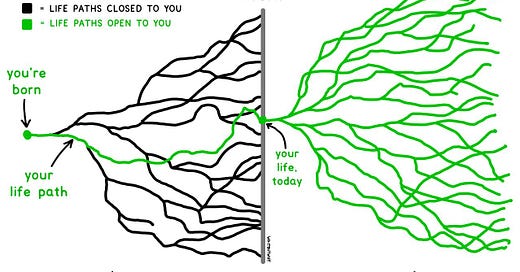Welcome to another Free Friday! Today’s post is a guest essay by Altos Ventures Director of Research Nick Chow. Before joining Altos, Nick was a quant at Wellington in their Investment Science division.
Nick actually just reached out to me after my Jack McDonald and Mike Shanahan letter to share his experience in the class, and we hit it off. He’s also going to be my collaborator for my “Friday Five” series, the first of which will come out next week.
PS/ Still working on the Jack essay, so if you have taken Jack’s class and would be willing to share your experience in it (on background and not to be quoted is fine), please respond to this email or send me a new one at kevin@12mv2.com. Twitter DMs work too.
With his final months at Stanford GSB looming, Nick found himself haunted by a simple truth: you can be anything, but you can’t be everything. In the face of infinite post-graduation possibilities, he realized that the real dread wasn’t about finding the perfect path — it was about trading the safety of potential for the reality of a single choice. In this essay, he explores how staying in endless possibility can trap us in a quiet limbo, a “purgatory” where all paths remain open but none are truly taken, and why stepping out of that stasis might be the only way to genuine fulfillment.
The essay is short but sweet, and reminds me one of my favorite images:
The purgatory of endless possibility
Let’s explore the unique existential dread of graduation together
The beginning of the end
Town Square at Stanford’s GSB is deserted. The courtyard’s walnut-varnished picnic tables and metal chairs are conspicuously empty. It's devoid of the raucous chatter of socializing students. I amble along the paved roads, meandering from the bubble of the business school to the rest of campus. Occasionally, a light winter breeze stirs a pile of dancing leaves, the Bay Area's version of tumbleweed rolling across a desolate Midwest landscape.
Many of my classmates are taking advantage of our nearly five-week-long winter break to visit far-flung international destinations. A large part of business school is creating close friendships, and these trips help forge these bonds.
So why aren’t I with them?
I've chosen my dorm over an exotic Airbnb, books and papers over adrenaline-pumping activities, and reflective solitude over whirlwind adventure. It’s my last winter break at Stanford — the beginning of the end — so I wanted to spend time reflecting and positioning myself to make the most out of the experience.
For the past few months, I've been feeling vestiges of a creeping ennui tugging at me, the tendrils of a malaise slowing me down. I realize that much of my anxiety stems from the opportunities that lay ahead.
Pluripotency
There's an idea in biology that's useful here: stem cells. Stem cells are pluripotent: a stem cell can turn into a muscle cell, a blood cell, a nerve cell, or any number of different cell types. In other words, stem cells have an infinitude of options for what they could become.
In many ways, a university student is a pluripotent stem cell.
In university, there's a smorgasbord of different opportunities everywhere. The buffet of options is spellbinding, with many doors leading down different paths. You can do anything.
You can do anything.
Our entire lives, we've been told that we can be anything.1
What we weren’t told, though, is that while you can be anything, you can't be everything.
As I sit here this winter break, I realize something.
To truly open one door entails closing many more.
The same is true with stem cells. Just as a stem cell differentiates into a singular cell, a student must choose. A student must trade infinite possibilities for one realized possibility.
Cue my existential dread.
Schrodinger's cat chooses to live
I suspect this is why so many of us gravitate towards consulting, high-prestige firms, graduate school, or any other number of "option-preserving jobs." Pursuing this optionality can backfire though: instead of using the options acquired to allow yourself to take greater risks, it can easily devolve into a game of continuing to collect optionality and never executing.2
Still, these institutions are attractive because they are places where the pluripotent self can be prolonged indefinitely.
But such institutions are purgatories … of endless possibility.
We are Schrodinger's cat, neither fully alive nor fully dead, but suspended somewhere in between. We've been able to live a thousand different lives in our imaginations, an infinite fractal of opportunity.
But none of it is truly real because it was all potential. By living in a world of potential and delaying our choices, we have already made our choice.
The salve?
We have to commit to something.
Commitment frees us from distraction and frivolity. Choice and commitment give remarkable clarity, slicing through the menu of endless attractive options and forcing us to truly focus on what is essential.
From choice flows action. Action creates information. Something is powerful when you choose it, becoming the lens that focuses all your attention and power.
Faulkner famously wrote, “In writing, you must kill your darlings.” It seems that in life, we must do the same to our infinitude of future selves.
Life offers every one of us a trade: your latent potential and all of what you could have been, in exchange for a chance at something truly real.
We must choose. Schrodinger's cat must live.
If you’d like to read more of Nick’s writing, you can do so here:
Cue the obligatory eye-roll from the people that think Millennials and Zoomers are too soft and spoiled, and certainly wouldn’t have survived in any other generation.
Many people have written much more thoughtful pieces critiquing the wanton pursuit of optionality — see for example The Trouble with Optionality and Winners Take All, by Anand Giridhadras.






